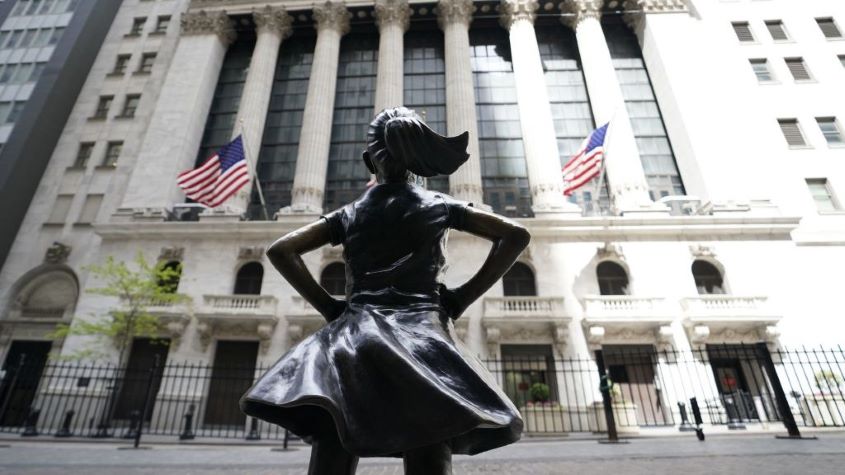The dangers of derivatives as the “Goldilocks era” ends
This is no longer a benign environment for investors, says Andrew Van Sickle. But – as the recent pension-fund derivatives blow-up shows – not everybody seems to have grasped that.


Get the latest financial news, insights and expert analysis from our award-winning MoneyWeek team, to help you understand what really matters when it comes to your finances.
You are now subscribed
Your newsletter sign-up was successful
Want to add more newsletters?

Twice daily
MoneyWeek
Get the latest financial news, insights and expert analysis from our award-winning MoneyWeek team, to help you understand what really matters when it comes to your finances.

Four times a week
Look After My Bills
Sign up to our free money-saving newsletter, filled with the latest news and expert advice to help you find the best tips and deals for managing your bills. Start saving today!
In 2002, Warren Buffett warned that derivatives were “financial weapons of mass destruction, carrying dangers that, while now latent, are potentially lethal”.
Nobody paid much attention at the time. Investment banks were busy constructing and selling an alphabet soup of derivatives: mortgages were sliced and diced into mortgage-backed securities (MBS); car, credit-card and corporate loans were bunched into collateralised debt obligations (CDOs).
The dangers of derivatives
The idea was that if “banks repackaged their loans, mixed them up and sold them to different people, it would diversify their exposure to risk”, as Gillian Tett of the Financial Times explained. “So instead of having a concentrated exposure to one type of risk, they’d be sharing that risk between them, making them stronger.” (They were also collecting fat fees from the repackaging process.)
MoneyWeek
Subscribe to MoneyWeek today and get your first six magazine issues absolutely FREE

Sign up to Money Morning
Don't miss the latest investment and personal finances news, market analysis, plus money-saving tips with our free twice-daily newsletter
Don't miss the latest investment and personal finances news, market analysis, plus money-saving tips with our free twice-daily newsletter
She likened the system to butchers making sausages with meat from different cows.
The problem was that once it became clear that chunks of the new securities had gone bad – when the housing market turned, and the value of subprime mortgages slumped – it paralysed the entire system, just as a batch of poisoned meat that had been spread far and wide from a factory would cause people to stop buying sausages.
Financial institutions stopped trading with each other to avoid contagion; the world economy froze. A system designed to reduce overall risk had actually increased it.
The past few days have provided another example of this phenomenon. Defined-benefit pension funds have been using a strategy known as liability-driven investment (LDI) to match their assets to their liabilities. This has involved using derivatives and leverage, rather than simply buying bonds.
That backfired spectacularly last week as yields soared, prompting the Bank of England to intervene to temper a vicious cycle of selling and pre-empt systemic risk.
Goodbye to the Goldilocks era
A striking feature of both these blow-ups is that the people involved seem to have assumed that the benign conditions underpinning the investment techniques would last forever.
In the mid-2000s everyone thought house prices would go on rising. More recently, it was assumed that interest rates and bond yields would stay low forever or rise only slowly.
James Coney in The Sunday Times recalls an “awkward silence” when someone on the board of a final-salary pension fund he used to sit on asked, after a speech on the merits of LDI, what would happen if rates began to rise.
The entire financial world is now learning what happens when rates change quickly. Bonds are going down, ending a bull market that had lasted since the early 1980s.
Mortgage rates are going up; house prices are likely to go down as the supply of credit is squeezed.
Stocks have also become too accustomed to low rates. Dearer money reduces the present value of future earnings, which is especially awkward for companies where rapid-growth assumptions are priced in.
That explains why technology stocks are slumping – the Nasdaq Composite index has fallen by almost 30% this year.
However, with inflation far from vanquished, risk aversion rising and further rate rises on the cards, markets skewed towards value rather than growth stocks and offering a tempting dividend yield may prove resilient – markets like Britain, for example.
Get the latest financial news, insights and expert analysis from our award-winning MoneyWeek team, to help you understand what really matters when it comes to your finances.

-
 Can mining stocks deliver golden gains?
Can mining stocks deliver golden gains?With gold and silver prices having outperformed the stock markets last year, mining stocks can be an effective, if volatile, means of gaining exposure
-
 8 ways the ‘sandwich generation’ can protect wealth
8 ways the ‘sandwich generation’ can protect wealthPeople squeezed between caring for ageing parents and adult children or younger grandchildren – known as the ‘sandwich generation’ – are at risk of neglecting their own financial planning. Here’s how to protect yourself and your loved ones’ wealth.
-
 The outlook for stocks is improving
The outlook for stocks is improvingThis is the best of times for investors, says Max King. Global risks are receding, but few have noticed.
-
 The building blocks for an income strategy: resilience, growth and diversification
The building blocks for an income strategy: resilience, growth and diversificationAdvertisement Feature Iain Pyle, Investment Manager, Shires Income plc
-
 Investment platforms offering measly interest rates on cash holdings – is your cash working hard enough?
Investment platforms offering measly interest rates on cash holdings – is your cash working hard enough?The interest rate on cash you hold within an investment account can be as low as 0.75%. We look at the worst cash rates on the market, and what you should do with your cash instead.
-
 Rethinking ESG investing
Rethinking ESG investingAnalysis Sustainable ESG funds are coming under attack for a lack of focus. Investors need to be selective
-
 Can a woman deliver you better returns?
Can a woman deliver you better returns?Tips Women often make better stock pickers than men, delivering stronger returns for investors - but with fewer females managing funds, how can you make sure you take advantage of the feminist touch when picking funds? Kalpana Fitzpatrick on how to filter funds run by women and why it matters.
-
 Flat fees vs percentage fees - are you paying too much for your investments?
Flat fees vs percentage fees - are you paying too much for your investments?We investigate whether it’s better to choose an investment platform with flat fees, or whether percentage charges could work out cheaper.
-
 What is a dividend yield?
What is a dividend yield?Videos Learn what a dividend yield is and what it can tell investors about a company's plans to return profits to its investors.
-
 Fund platform launches low cost £4.99 a month service for small investors - we see how it compares
Fund platform launches low cost £4.99 a month service for small investors - we see how it comparesAdvice Aimed at investors with small investment pots of £30k or less, fund platform interactive investors has launched a low costs service - but is it any good and how does it compare to rivals?